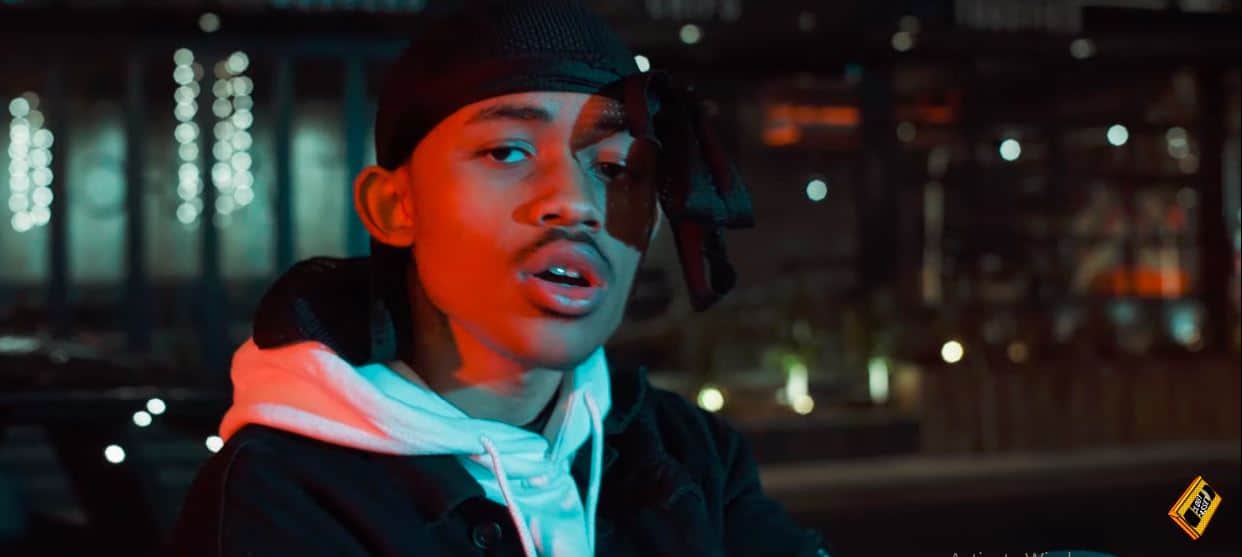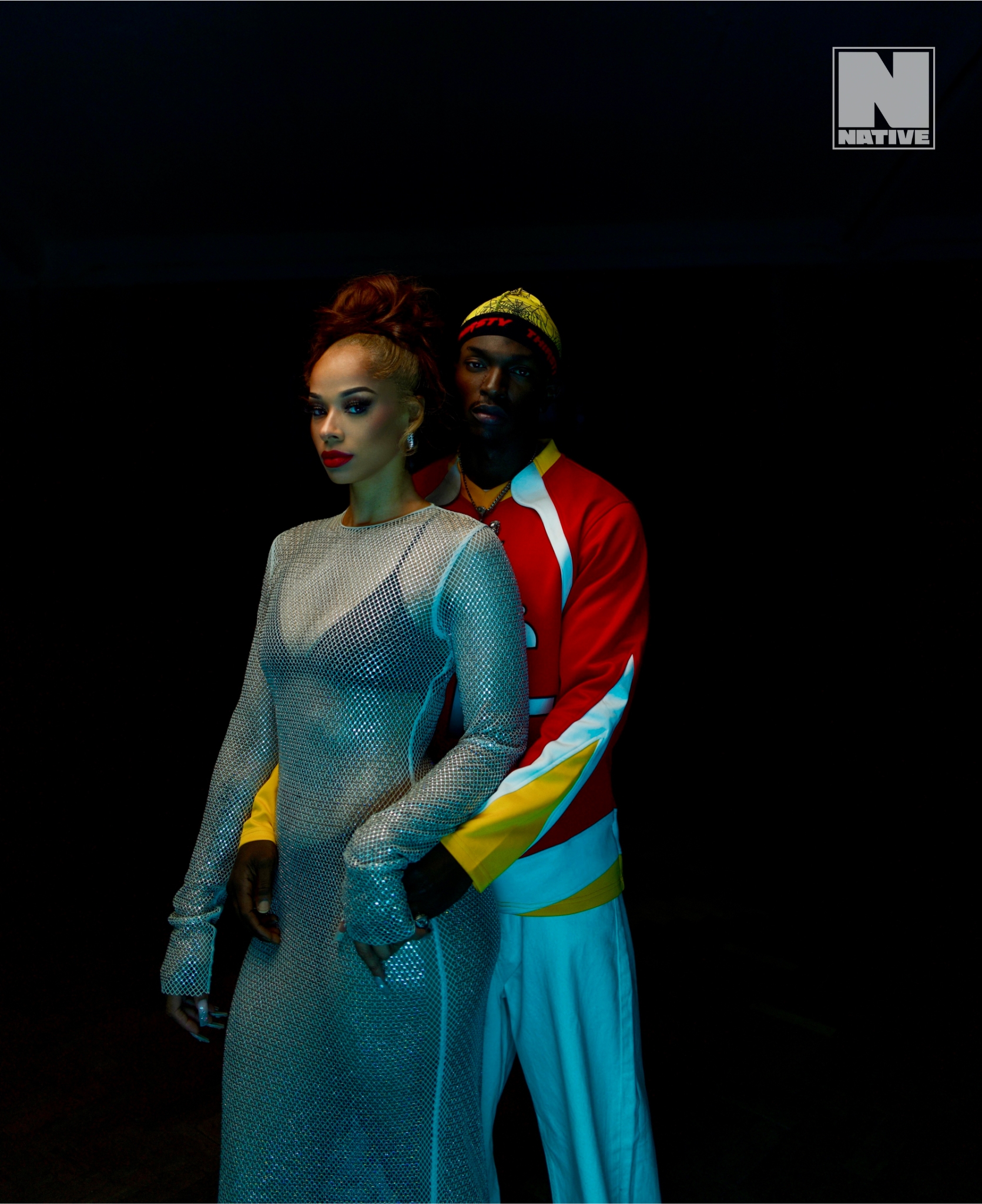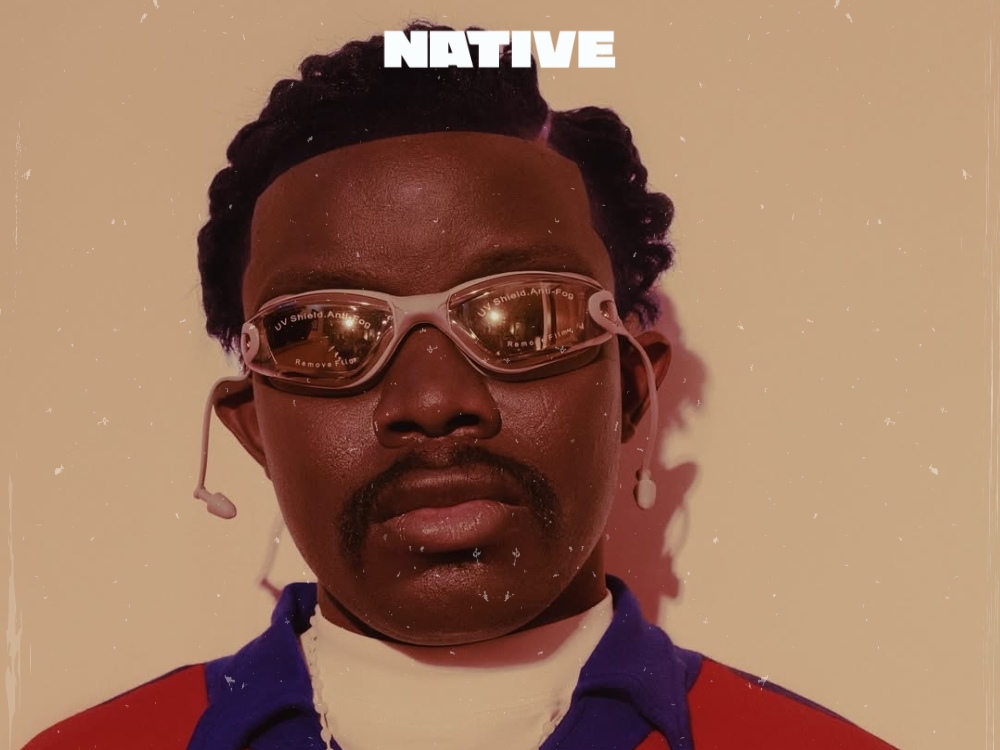The Big Hash shares music video for “Circles”
Adding an unexpected twist to the song's emotive narrative



Adding an unexpected twist to the song's emotive narrative
South Africam teenage rap sensation, The Big Hash, has just released the music video for “Circles”, one of the lead singles off his debut studio album, ‘Young’. His charmingly somber reflection on his failed relationship over the bubbly trap beat 808x produces highlights his ability to channel heartfelt introspection without losing any of the catchy sensibilities of trap music.
Morale Pablo Phala directs the video for “Circles”, retelling the heartwrenching story as he shows The Big Hash being double-timed by a lover who he later catches on a date with someone else. However, the music video adds some spin to the narrative with the closing scene suggesting that it was all a dream and perhaps, it was all in his head. The expands on the song to give a great representation of how anxiety and insecurities can skewer the way we view our relationships.
Watch the music video for The Big Hash’s “Circles” below.
Featured Image Credits: YouTube/innanetwav.
[mc4wp_form id=”26074″]
You are meeting Debola at a strange time in his life. He wandered into a dream and lost his way back. Tweet at him @debola_abimbolu


From working her way out of London’s Myatt’s Field, Tanika is now setting her sights on the bright lights...
Across a career that’s in its second decade, Tanika has proven to be a force in her own right, holding her own on collaborations with Black British stars like Stormzy and Wretch 32, as well as popular record producer Naughty Boy–working with the Grammy-nominated beatmaker on his acclaimed ‘Hotel Cabana’ album.
Following a stint as an actor, she returned to the studio in 2021, releasing a new extended play, ‘333,’ in 2023. The project carried all the hallmarks of Tanika at her tantalising best: lilting cadences, well-paced narratives, a songwriting that reaches for the heart of the matter.
On her latest song, “Fast Fwd,” she’s growing into her own and stepping into a new era. In many ways, “Fast Fwd,” a hypnotic, sultry anthem, is landing just in time for summer revelry. Produced by her longtime collaborator, Naughty Boy, her silky vocals land effortlessly on the mid-tempo instrumental and pulsates with her desire for her love interest.
Joined on the song by her fiancé, Kida Kudz, they make an interesting duo and replicate the synergy they had on “Nobody,” off Kudz’s 2021 ‘Top Memba.’ Distinctively marked by use of neon lights, the video for the song captures the effervescence of romance that Tanika hums about throughout the song.
From working her way out of London’s Myatt’s Field to becoming a star with millions of streams, Tanika is now setting her sights on the bright lights of superstardom. Ahead of the official release of the single, we had a brief chat with Tanika about her career, the influences for “Fast Fwd,” and working with KIda Kudz on it.
Her answers, which follow below, have been lightly edited for clarity.
How would you describe where you are in your career right now?
I’m just enjoying the journey.
What does the release of “Fast Fwd” signify for you?
It signifies love.
Why is Kida Kudz a fit for the song? (
To be honest, we didn’t plan to do another song together. I have worked on two records with him before (“Nobody” and “Tasty Time” ) but we never thought to shoot a video for it.. “Fast Fwd” felt like a real testimony of our present moment in the relationship.
You’ve worked extensively with Naughty Boy and he’s helped with “Fast Fwd,” what’s your relationship like and why does it work?
Naughty Boy knows me very well. We’ve known one another for over 10 years, so he knows what fits me musically. We gel. I think him knowing me and being a fan of Kida’s music made it all work. Naughty Boy does his listening before he makes a beat for you. A lot of producers don’t really understand the importance of knowing the artist musically but he does.
What were you aiming for with the video?
To be honest, I’m aiming for nothing. I’m just enjoying the journey. It’s been a very long road and I know I still have a long way to go.
Catch an exclusive view of “Fast Fwd” below.

A celebration of creativity and cultural
Dutch textile brand Vlisco recently unveiled its latest campaign ‘The Garden Of Sisterhood,’ as part of its women’s month celebration. The campaign, which looks to extend Vlisco’s rich legacy in African fashion and its ongoing celebration of creativity and cultural storytelling, takes inspiration from Congolese musical icon Fally Ipupa’s latest single, “Mayanga.” The song’s accompanying music video was shot in the Ivory Coast, and seamlessly balances Ipupa’s signature soulful Rumba music with intricate floral motifs and soft, elegant colour palettes that celebrate the strength and individuality that blossoms through community.
In addition to Fally Ipupa, Vlisco also tapped up Ivorian fashion designer Loza Maléombho and Nigerian director Daniel Obasi to contribute to ‘The Garden Of Sisterhood’ campaign. Maléombho’s unique designs and Obasi’s striking storytelling helped contribute to actualising Vlisco’s distinct aesthetic and vision of merging heritage, creativity and fashion.
In a statement discussing the collaboration with Vlisco, the Congolese superstar described it as a beautiful experience. “They understood my vision of working with talented artists and honouring the beautiful women who wear Vlisco fabrics. By creating exclusive designs for me and the remarkable women in the cast, Vlisco really brought our artistic vision to life, harmoniously fusing music and fashion,” he said.
Similarly, Marlou van Engelen, the creative director of Vlisco, expressed that it was an honour working with Fally Ipupa. “His song ‘MAYANGA’ perfectly reflects our admiration for the women who shaped us, inspire us, and mean so much to us. For us, it’s not just about fashion; it’s about the stories told through our beautiful prints. And I believe the best stories are always told together,” she said in a statement.

Having worked across every area in Nigeria’s sprawling music scene, T.G Omori’s lore has taken on an...
There are two types of producers in the industry: those who approach the art with a keen sense of business—they know how to sniff out opportunities, and are generally aware of industry-wide trends and currents—and those who set the tone, who set the standards. The latter group is the animating force of the industry, TG Omori says in a 2022 interview with Korty EO. During the interview, he’s slouched in his seat, framed against the backdrop of a grand piano, wearing a bandana, dark shades, and a silk Hawaiian shirt—the first few buttons undone to reveal a glistening silver chain. In the intervening moments—fractions of a second—before Korty responds to the loaded assertion he just trotted out, the air is thick with balmy anticipation and nervous excitement “Which group do you belong to?” She asks, lancing the tense air that had inflated sharply like a balloon. “Me? Which group do you think I belong to?” He fires back, his mouth drawn into a smile.
Music video production, is at its heart, an art form that is significantly beholden to the vision and whims of the music artist and label executives. Music video directors—rightly—have to walk the tightrope between sufficiently distilling the essence of a song into a video and managing the desires and whims of an artist and their representatives. The problem, however, is that in between all of this, there’s often little wiggle room for the director to execute his ideas significantly. The result is often a situation where the music video director becomes diminished from an artist to a little more than an artisan. TG Omori, however, has in his long career railed against this. There’s no doubt that like his peers he has to straddle the demands of the song and the vision of his clients, but he does this without effacing his distinctive creative language. He has a fluency in packing his work with heady joy, a joy that pervades and steadies Nigerian society despite the many challenges it’s faced with.
TG Omori stumbled into music video direction by chance. He had been struggling as an actor, begging directors for roles as an extra—his skits and sketches from this period are still available on the internet—when it dawned on him that achieving success as a performing act was incredibly difficult. He noticed that a lot of upcoming actors were struggling to get by and often had to abase themselves in the process of currying favors with directors. The role of film director slowly started to worm its way into his heart, driving a wedge between him and his acting aspirations. Finally won over, he made the pivot to filmmaking, eventually settling on music video direction on account of its relative ease.
His early works lack his distinctive style, instead taking inspiration from directors before him. Consider YCee’s “My Side” which he directed in 2018. The video opens with YCee perched atop a high-rise building. The colors are muted, contrasting his current works which generously deploy bright hues and saturated lighting. There’s a gorgeous scene where YCee is framed against a wall with slits. Shafts of light stream in from behind him, creating a transcendent portrayal of an animated silhouette enveloped in light. The entire video evokes the elevated minimalism of Moe Musa. Think of the opening scene where YCee saunters atop a high-rise building, it’s a motif that has been deployed countless times by Nigerian directors, but something about that scene—the minimalism of the setting juxtaposed with dynamic camera movements—brings to mind Moe Musa’s video for Olamide’s “Bobo.”
While his early works lack his signature–the distinctive exuberance we’ve come to know him for–they hold kernels of what would come to be. Even in the muted ambiance of “My Side,” we see an early iteration of the pristinely dynamic camera movements that sweep through his oeuvre. In the video of Olamide, Wizkid & ID Cabasa’s “Totori,” released in 2019, his directional language starts to take form. He was contracted at the last minute to film the video—he had less than a day to come up with a concept, marshal his crew and steward the logistical aspect of the shoot, and yet in this pressure cannon, a gem was formed.
The video contains just one main scene—one of the few vestiges of the shoot’s hurried nature. We see Wizkid and Olamide encircled by an energetic crowd. A circle of dark bodies sways to the beat, handkerchiefs flailing in the air. We also see the flamboyant lighting that has come to define TG Omori’s work. There are light sources outside the frame but the scene itself is illuminated by a clever array of light sources. Moving headlights cut through clouds of smoke, LED lights and tungsten bulbs of varying colors suffuse the atmosphere with warm iridescence. The effect is the feeling of being transported to a rave. What’s perhaps most striking about this video is that, having been hastily formulated, it contains a single scene, and yet not one minute of it feels boring or repetitive.
Having worked across virtually every area in Nigeria’s sprawling music scene T.G Omori’s lore has taken on an almost mythic quality over the years. However, nowhere is his impact more pronounced than in the Nigerian Street-Pop scene. Today, Street-Pop has largely ridden itself of its underground status. Artists like Seyi Vibez, Shallipopi, and Asake imperiously lord over charts in the country, each boldly raising the banner of their respective cities and hoods. But this wasn’t always the case. In Afropop’s early days, Street-Pop was relegated to the margins, sneered at by industry gatekeepers for its brash flourishes, even though the mainstream routinely tapped it for inspiration. By the early 2010s a new generation of Street-Pop acts—Olamide, Phyno, and Reminisce amongst others—would elevate Street-Pop’s profile to historic heights. But it still maintained an insidiously tense relationship with the mainstream.
The first signs of an industry-wide shift–the shift that has blossomed into Street-Pop’s hegemony today–arrived in 2019 at the height of the Zanku movement. The addition of “movement” underscores just how significant Zanku was. On one front, it’s the title of Zlatan’s titular 2018 hit and an acronym for the phrase “Zlatan Abeg No Kill Us.” But it’s also used to denote a distinct flavor of Street-Pop characterized by skittering drums, cascading percussion, and a laissez-faire style of delivery—heralded in late 2018 by Street-Pop folk heroes like Zlatan, Chinko Ekun, and Naira Marley.
When culture critics reminisce on the Zanku era, the focus is usually on the artists who spearheaded it, but T.G Omori’s contributions to that period of Street-Pop’s ascendancy are impossible to ignore. While the artists shaped the sounds and dance steps that defined its grassroots appeal, it was T.G Omori who gave it its distinctive aesthetic. His early collaborations with Zlatan—most notably on “Shotan” and “Bolanle” offered a template for how the videos of the era could be presented on screen: hyper-stylized yet rooted in the whimsical chaos of street culture. His use of slow motion, jump cuts, and dynamic tracking shots turned what would otherwise be yet another ephemeral trend in Afropop’s dynamic history into a cinematic experience that embodied the feeling of the era.
His video of Naira Marley’s “Soapy” is especially telling. Arriving in the wake of Naira Marley’s arrest by Nigeria’s anti-graft agency, the Economic and Financial Crimes Commision (E.F.C.C.), the video very cleverly satirizes the experience, framing him, as well as others who were arrested alongside him—Zlatan and Rahman Jago, amongst others—as heroes as opposed to criminals. It’s important to grasp the significance of this. Street-Pop acts had always been treated with suspicion. There almost seemed to be a tacit consensus that regardless of their success or status, they mirrored an unsavory part of society, and so they deserved the asterisk that seemed to loom over their every move. The arrest of Naira Marley and his posse only served to further strengthen this narrative. TG Omori’s video, however, spun an alternative narrative, a hagiography perhaps, from this fraught situation. The video opens with annotated mugshots of the group, their names tacked onto each mugshot. Through TG Omori’s lens, prison becomes transformed from a place of despondency to a sanctuary where friends happily muck around, regaling themselves with games and bubbly dancing.
TG Omori’s influence in shaping emerging sonic movements extends beyond the Zanku era. It’s impossible to recount Asake’s rise without considering the video director’s input. 2022 marked Asake’s singular and meteoric rise to fame. His music blurred the boundaries of genres, creating an amorphous sound spread across the continent with intensity. His ascendancy also broke the boundaries between Street-Pop and mainstream Afropop, marking the dawn of a new era. TG Omori played a pivotal part in Asake’s early days, crafting a freewheeling visual aesthetic to match Asake’s disposition for subversion. In the video of Asake’s “Peace Be Unto You,” we see his freewheeling ethos at its peak. The song’s themes span faith, hustle, success, and street credibility. In the hands of a lesser director, the video would have followed the familiar script of a grass-to-grace narrative. TG Omori, however, rejected that cliché in favor of a more abstract approach.
Each of the themes explored in the song is distilled to a representative scene, the scenes are then cleverly stitched into a brilliant whole. The opening sequence sees Asake on a motorcycle, a formation of riders trailing behind him. As he rips through the freeway, doting fans wave and scream in adulation. Watching this scene, one is tangibly enveloped in the feeling of street credibility, the sense of ascendancy, that Asake explores in the song. It’s poignant and symbolic, conveying the essence of the song in a manner that would be difficult to achieve with a literal narrative. Similarly, the video of Seyi Vibez’s “Shaolin,” TG Omori’s inaugural work following a health-induced break, defies any discernible narrative logic in favor of a freewheeling approach. The video’s boisterous energy almost seems like a bold assertion of his continued reign; as if to say “I’m back like I never left.”
In August of 2024, through a series of heart-wrenching videos, as well as tweets, TG Omori let the public in on his health challenges. In a tweet, he revealed that his only brother gave him a kidney, so he could live again. He revealed that the transplant failed and, later, brought on thoughts of mortality. In one harrowing photo he posted on his Instagram stories, he’s hooked to a life support machine, the words “I don’t want to die” superimposed on the image. In the intervening moments, prayers and well-wishes poured in from all corners of social media. In recent months, however, he appears to be in better health and has fully thrust himself back into work, with “Shaolin” being the first of many projects he has lined up.
Eight years after his directorial debut, he remains not just relevant, but the frontman in an industry that’s as cut-throat as it gets. It’s uncommon in Nigeria’s music scene—for a video director to maintain this level of dominance for nearly a decade into the game. It’s his fidelity to subversion and his unique perspective on the art of videography that has earned him his position as Nigeria’s foremost video director. To watch a TG Omori video is to be transported into a world of his creation: where the sun pulses with exuberance, foliage throbs with palpable life, streams of light vibrate with saturated colors, and the streets are perpetually packed with graceful black bodies. It is a world where, regardless of the tyranny of fate, joy manages to always streak through.
